Making science accessible with Science Outreach – Athabasca
We live in a world touched by science, and its resulting technologies are in nearly everything we do.
Most of us start our workdays with electronic alarms. We wash ourselves with water treated and piped from remote locations and heated with fuels mined from deep in the earth. We eat breakfasts consisting of foods grown and processed far away. We ride in complex vehicles to work in jobs that directly or indirectly use sophisticated computers. All of these things and processes depend upon an understanding of science.
However, most people have very limited backgrounds in science and often feel intimidated from their lack of understanding of science and technology.
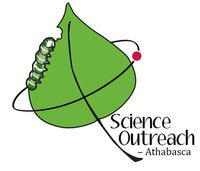
That’s why Athabasca University (AU), through what is now the Faculty of Science & Technology, has been helping the general public learn about science through Science Outreach – Athabasca for nearly two decades.
Since its inception, Science Outreach – Athabasca has delivered more than 980 activities to more than 20,000 adults and children in 19 communities across north-central Alberta, and its website reaches people all around the world.
There are many ways we provide this informal science education.
Public talks
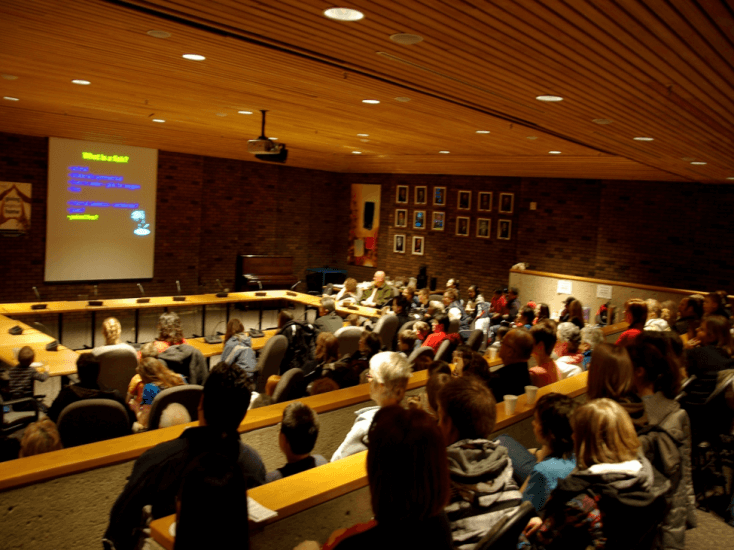
Each year, Science Outreach – Athabasca runs a speaker series with seven to eight talks.
These public presentations are held on AU’s main campus in Athabasca, Alta. Scientists from AU and other universities, as well as those from government and industry, give illustrated talks on a variety of topics ranging from astronomy to zoology.
Notable speakers have included former astronaut and current federal Transportation Minister Marc Garneau and paleontologist Phillip Currie, for whom the Phillip J. Currie Dinosaur Museum in Wembley, Alta., is named.
Including the speaker series and other similar events, Science Outreach – Athabasca has delivered more than 320 public presentations.
School talks

Many schools, typically within the Aspen View School Division in the Athabasca region, invite speakers to give lectures on science topics related to the school curricula.
While most talks are given in the school, presentations are also given in the Science Teaching Laboratory at AU’s main campus in Athabasca.
There have now been more than 250 of these presentations.
Science camps & field trips
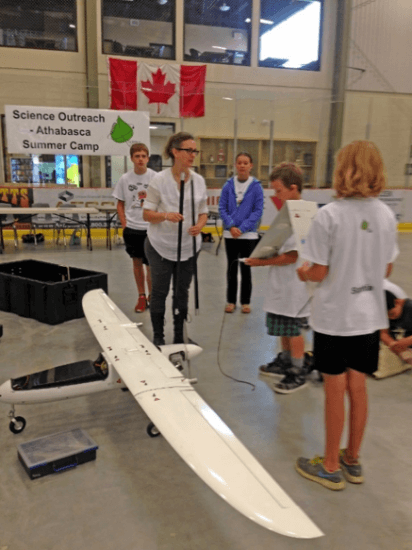
Science camps are usually half-day or one-day sessions, held in various locations for many organizations including schools and local youth organizations such as Boy Scouts, Girl Guides, and Junior Forest Rangers.
We have also hosted some three-day Lego Robotics camps at the Athabasca Regional Multiplex.
Science Outreach – Athabasca also hosts outdoor activities for adults, children, or both. Adult excursions have been conducted on the topics of mushrooms and medicinal plants, while bird and butterfly counts have drawn participants of all ages.
Children have gone on general nature walks, panned for “gold,” examined animal tracks in the snow, and studied terrestrial and aquatic insects.
We have now hosted more than 180 science camps and field trips.
Exhibits, interactive signs, brochures, and a website
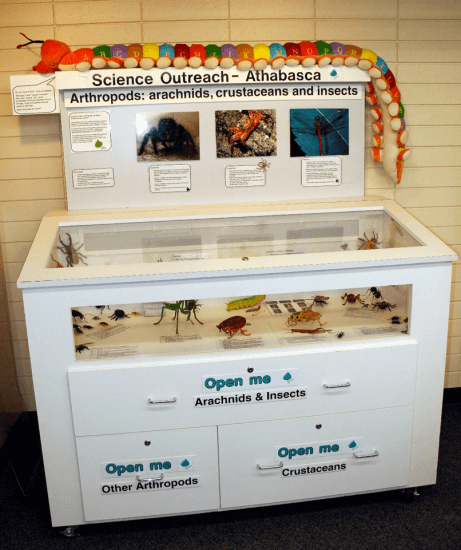
Static displays and printed materials are another way Science Outreach – Athabasca has worked to bring science to the general public.
We constructed a travelling display case that went to all schools in the Aspen View School Division and other institutions. Topics included birds, mollusks and arthropods. We also made a traveling exhibit on extinct and extant bison. A static display case at AU’s main campus in Athabasca had exhibits on fossils, skeletons, arachnids, butterflies, and plants.
In addition, travelling displays were rented from Alberta Science Foundation, Telus World of Science, and Canadian Museum of Nature. We also constructed back-packs filled with science equipment and information that were loaned to children through libraries and local schools, and later given away.
In cooperation with other groups and agencies, we have also produced a few interpretive signs that can be found around the region, and some brochures about local animals.
For those who want a little more, the Science Outreach – Athabasca website has listing of computer links for young children, teens, adults, and teachers. Copies of the brochures are available on the websites, as well as plenty of other resources including listings of upcoming events.
Other activities
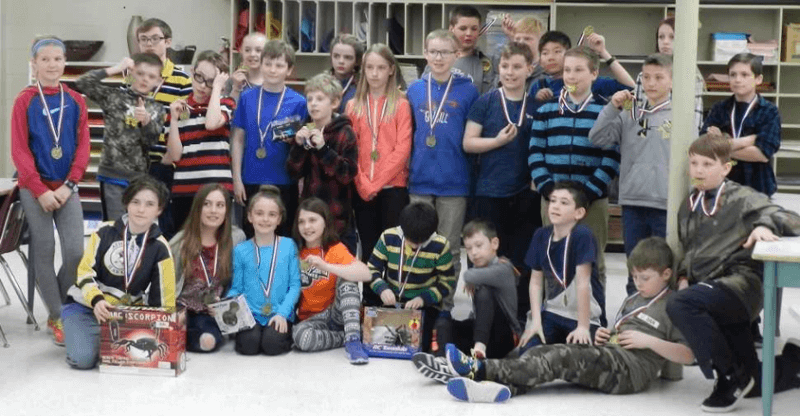
On top of the above-listed activities, Science Outreach – Athabasca has planned and hosted dozens of other events, including film festivals, special talks/presentations, and a river conference.
With outside funding support, we also prepared a bibliography of 25,000 scientific references on the Athabasca River Basin, which was later donated to the Athabasca River Basin Research Institute when it was established.
Helping to inspire the next generation of scientists, our volunteers have proudly judged science fairs in various schools across the region.
Powered by volunteers

Much of the success we have seen at Science Outreach – Athabasca is due to a dedicated group of volunteers. The current chair is Dr. Lisa Carter, former dean of AU’s Faculty of Science & Technology. AU pays for the half-time co-ordinator position, Linda Lindballe, who is the only paid staff for the organization. She handles administrative work and is the main contact person.
Partnerships and collaboration with outside organizations are invaluable. These include Aspen View School Division, Crooked Creek Conservancy Society of Athabasca, Athabasca Regional Recreation, Junior Forest Wardens, Athabasca Peace Initiative, Athabasca Native Friendship Centre, Canada World Youth, Telus World of Science, Science Alberta Foundation, Canadian Museum of Nature, Rotary, and the Royal Alberta Museum.
Most events are free of charge, thanks to the many people who volunteer their time. For example, nearly all speakers for public and school talks volunteer their time and often pay for their own transportation and accommodation costs. We do incur some costs for labour, materials, shipping, and advertising. We have raised more then $500,000 from federal, provincial, industrial, and municipal grants—as well as from individuals’ donations.
You can learn more on the Science Outreach – Athabasca website—or by registering for a course from AU’s Faculty of Science & Technology.